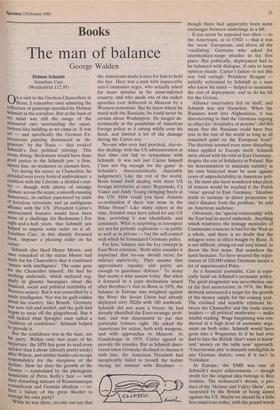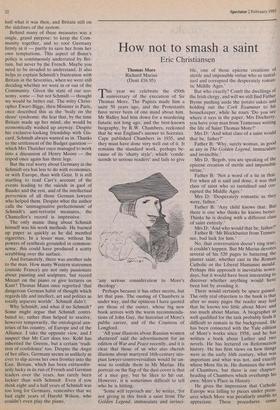Books
The man of balance
George Walden
Helmut Schmidt Jonathan Can (Weidenfeld £12.95) On a visit to the German Chancellery in Bonn, I remember once admiring the collection of paintings installed by Helmut Schmidt in the corridors. But at the back of lily mind was still the image of the armoured cars surrounding the squat, fortress-like building as we came in. It was art — and specifically the German Ex- pressionist painting denounced as 'de- generate' by the Nazis — that evoked Schmidt's first political stirrings. This seems fitting: Beckmann would have done good justice to the Schmidt jaw: a firm, square line, no weakness or sfumato here. Yet during his career as Chancellor, he Presided over every form of ambivalence: a coalition with the Liberals; a divided coun- try — though with plenty of smudgy sfumato across the seam; a smooth-running democracy, its surface punctured by stabs of ferocious terrorism; and an ambiguous alliance with the US. (President Carter's unstructured features would have been more of a challenge for Beckmann.) For elght-and-a-half years, that Schmidt jaw helped to impose some order on it all. Jonathan Carr, in this sharply focussed book, imposes a pleasing order on his career.
Schmidt also liked Henry Moore, and °lice remarked of the statue Moore had made for his Chancellery that it combined nature with intelligence'. The same goes for the Chancellor himself. He had his seething underside, which surfaced reg- ularly in gloomy harangues about the financial, social and political instability of Western society. But it was controlled by a steely intelligence. Nor was he guilt-ridden about his country, like Brandt. Germany was now rich and settled, and the guilt had begun to wear off the gingerbread. But it Still lacked what Spengler once called a tradition of confidence'. Schmidt helped to provide it.
But the confidence was in the man, not his party. Within only two years of his departure, the SPD has gone to seed even quicker than Labour (already pretty seedy) after Wilson, and neither leader can escape responsibility for the steepness of the decline. How far does the growth of the Greens — symbolised by the photogenic fanaticism of Petra Kelly's face — with their disturbing mixture of Rousseauesque romanticism and German idealism — re- flect a failure of the great Macher to manage his own party? While he was there, no-one can say that the Americans made it easy for him to hold the line. Here was a man with impeccable anti-Communist urges, who actually asked for more missiles in his atom-infested country, and who made one of the rudest speeches ever delivered in Moscow by a Western statesman. But he knew where he stood with the Russians; he could never be certain about Washington. He lunged de- terminedly at the pendulum of American foreign policy as it swung wildly over his head, and limited a lot of the damage during the Carter era.
No-one who ever had practical, day-to- day dealings with the US administration at that time can fail to sympathise with Schmidt. It was not just Carter himself (lust not big enough for the game' in Schmidt's characteristically charitable judgement). Like the rest of the world, Bonn found itself dealing with three US foreign secretaries at once: Brzezinski, Cy Vance and Andy Young swinging freely at the UN. How could you have Atlantic co-ordination if there was none in the White House? Like many others at the time, Schmidt must have ached for any US line, providing it was identifiable and consistent. What is surprising in retrospect are not his periodic explosions — in public as well as in private — but the self-control with which he formulated Germany policy.
For him, balance was the key concept in East/West relations: 'Both sides consider it important that no-one should strive for military superiority. They assume that approximate equality and parity are. enough to guarantee defence.' To many that seems a wise maxim today. But when it featured in a joint declaration issued after Brezhnev's visit to Bonn in 1978, the balance in Europe was weighted against the West: the Soviet Union had already deployed sixty SS20s with 180 warheads. Schmidt did not want a freeze; he had already identified the Euro-strategic prob- lem, and was determined to put that particular balance right. He asked the Americans for action, both with weapons, and with approaches to Moscow. At Guadeloupe in 1979, Carter agreed to provide the missiles. But as Schmidt disco- vered when Gromyko declined to discuss it with him, the American President had inexplicably failed to broach the matter during his summit with Brezhnev — though there had apparently been some exchanges between underlings in a lift.
It can never be repeated too often — to the Americans, or to CND — that it was the 'weak' Europeans, and above all the 'vacillating' Germans who asked for intermediate-range missiles in the first place. But politically, deployment had to be balanced with dialogue, if only to keep opinion steady. Carter's failure to see this was bad enough. President Reagan — initially welcomed by Schmidt as a man who knew his mind — helped to maximise the cost of deployment, and so do his bit for the Greens.
Alliance uncertainty fed on itself, and Schmidt was not blameless. When the Russians went into Afghanistan, it was disconcerting to find the Germans arguing in effect for 'divisibility of detente'; did this mean that the Russians could have free rein in the rest of the world as long as all remained quiet on the European front? The doctrine seemed even more disturbing when applied to Europe itself; Schmidt went ahead with his visit to East Germany, despite the rise of Solidarity in Poland. But his determination to maintain stability in his own backyard must be seen against years of unpredictability in American poli- cy. He must also have wondered what pitch of tension would be reached if the Polish 'virus' spread to East Germany. 'Idealism tends to increase in direct proportion to one's distance from the problem,' he told an American audience.
Obviously, the 'special relationship' with the East had its moral underside. Anything which reinforces the hostage mentality of Communist countries is bad for the West as a whole, and there is no doubt that the refugees were in effect bought by Bonn. It is not difficult, sitting on our cosy island, to throw the first stone. But somehow the hand hesitates. To have secured the repat- riation of 120,000 ethnic Germans means a lot of unpersecuted Poles.
As a financial journalist, Carr is espe- cially lucid on Schmidt's economic policy. The great pragmatist was nevertheless one of the first monetarists; in 1974, the Bun- desbank announced a target for the growth of the money supply for the coming year. The civilised and sensible relations be- tween the Chancellor and the trade union leaders — all political moderates — make wistful reading. Wage bargaining was con- ducted at a high level of economic argu- ment on both sides. Schmidt would have gone into a Wagnerian fit if he had ever had to face the British 'don't want to know' and 'money on the table now' approach. 'Uneconomic pits' is instantly intelligible in any German dialect, even if it isn't in Yorkshire.
In Europe, the EMS was one of Schmidt's major achievements — though credit for the original idea belongs to Roy Jenkins. The technocrat's dream, a pro- duct of the 'Helmut and Valery Show', was suspected by the British of being aimed against the US. Maybe we should be a little less suspicious today, with the pound worth half what it was then, and Britain still on the sidelines of the system.
Behind many of these measures was a single, grand purpose: to keep the Com- munity together, and to root Germany firmly in it — partly to save her from her own temptations. This aspect of Bonn's policy is continuously underrated by Bri- tain, but never by the French. Maybe you need to be invaded to understand. It also helps to explain Schmidt's frustration with Britain in the Seventies, when we were still deciding whether we were in or out of the Community. Given the state of our eco- nomy, some — but not Schmidt — thought we would be better out. The witty Christ- opher Ewart-Biggs, then Minister in Paris, once described this as the 'body on the shore' syndrome: the fear that, by the time Britain made up her mind, she would be economically washed up anyway. Despite his exclusive-looking friendship with Gis- card, Schmidt always wanted us in. Thanks to the settlement of the Budget question — which Mrs Thatcher once managed to work into a discussion of Henry Moore — the tripod once again has three legs.
But the real worry about Germany in the Schmidt era has less to do with economics, or with Europe, than with Geist. It is still startling to read Carr's account of the events leading to the suicide in gaol of Baader and the rest, and of the intellectual perversion of all those German lawyers who helped them. Despite what the author calls the 'unimaginative perfectionism' of Schmidt's anti-terrorist measures, the Chancellor's record is impressive.
The only manic thing about Schmidt himself was his work methods. He burned up paper as quickly as he did menthol cigarettes. In a lesser man, without his powers of synthesis grounded in common- sense, this could have produced a scatty scrabbling over the surface.
And fortunately, there was another side to the man. How many Western statesmen (outside France) are not only passionate about painting and sculpture, but record Mozart on the piano or give lectures on Kant? Thomas Mann once regretted 'that dangerous German habit of thought which regards life and intellect, art and politics as totally separate worlds'. Schmidt didn't.
Why Schmidt, and what if no Schmidt? Some might argue that Schmidt contri- buted to, rather than helped to resolve, however temporarily, the ontological anx- ieties of his country, of Europe and of the Alliance. I take the opposite view, and I suspect that Mr Carr does too. Kohl has inherited the Greens, but a certain 'tradi- tion of confidence' too. Despite the Angst of her allies, Germany seems as unlikely as ever to slip across her own frontier into the East. Britain, which has been extraordin- arily lucky in its run of French and German leaders over the years, has rarely been luckier than with Schmidt. Even if you think eight and a half years of Schmidt was too long for Germany, remember that we had eight years of Harold Wilson, who couldn't even play the piano.











































 Previous page
Previous page